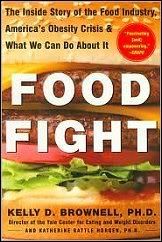 In FOOD FIGHT, Brownell and Horgen explore the obesity crisis in the United States. They discuss the epidemic’s possible causes, its contribution to poor health, the toxic environment, the persuasion of food and soda companies, and most importantly the solutions.
In FOOD FIGHT, Brownell and Horgen explore the obesity crisis in the United States. They discuss the epidemic’s possible causes, its contribution to poor health, the toxic environment, the persuasion of food and soda companies, and most importantly the solutions.The book primarily focuses on problems in the United States, but dedicates almost a whole chapter to explaining how obesity has become a worldwide problem. As Canadians, we are not exempt from this epidemic. We are second only to the U.S. for obesity rates and many of the problems occurring in the U.S. are also applicable in Canada.
Why are North Americans fat? The answer is simple. The average person consumes more calories than their body needs and rarely exercises. If that person were to limit their caloric intake to a healthy amount and exercise for thirty minutes a day, weight would be maintained.
If only the obesity problem was that simple. Placing responsibility solely on the individual ignores all outside factors. Food Fight explains how Americans are living in “The Toxic Environment”. Obesity is almost inevitable due to environment.
People eat junk food because it is fast, cheap, and tastes good. Junk food is available twenty four hours a day. Soda and food portions have dramatically increased in size. Processed food is cheaper than healthy food such as fruits and vegetables, which are more expensive and harder to find. Eating poorly is simply easier than eating healthy.
Exercising is also more difficult. Instead of walking or biking people are driving. In many cities t is dangerous for people to walk or bike because roads are unsafe. A lack of crosswalks, sidewalks, bicycle only lanes, and properly paved roads are major issues.
Food companies are a huge part of the obesity epidemic. These corporations are making millions selling products with high fat and sugar contents. They say their products can be part of a healthy lifestyle and there are no links between fast food or soda and obesity. Studies have proved otherwise. Corporations claim they give people choice, but people cannot make the right choices if healthy foods are not available.
Coke and Pepsi urge educators to put soda machines in schools in exchange for thousands of dollars. However, they are earning millions in profits. The government should be investing in education. Schools shouldn't have to depend on soda companies for money.
Overall, the writing becomes repetitive at times, but this can be overlooked. Arguments are backed up with multiple facts and research. The book brings up important issues like advertising to children, soda in schools, environmental and economic factors of obesity, the hypocrisy of food companies, and the government's role. After every problem a solution is given. Change is emphasized and encouraged. The authors make the reader feel like change is possible; that the food fight could be won.
No comments:
Post a Comment